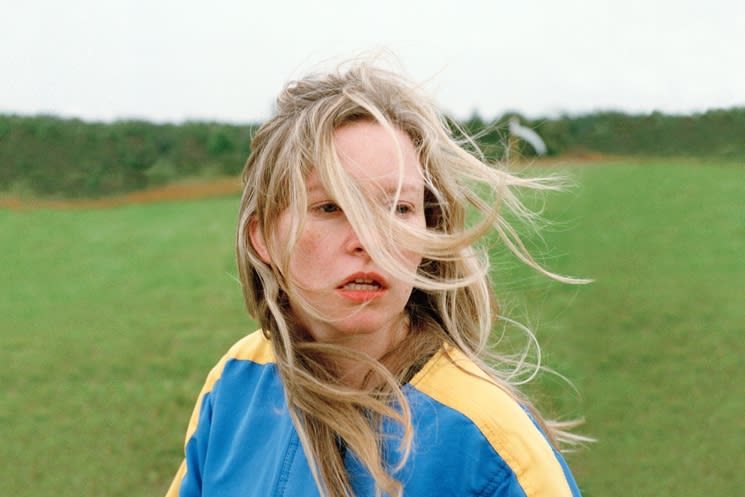After a string of well-received short films in the mid-2000s, Toronto's Kazik Radwanski returns with his third feature, the final entry in a character-driven thematic trilogy centred on social outsiders. After Derek in 2012's Tower (a coarse 30-something living in his parents' basement) and Erwin in 2015's How Heavy This Hammer (a gradually unmoored husband and father), we now follow Anne in Anne at 13,000 ft, a young woman quietly unraveling over the course of a few months in Toronto while developing a taste for skydiving.
Deragh Campbell gives a convincing and deeply felt performance as Anne, a single young woman suffering from an unidentified disorder, eking out a living at a daycare centre where her lapses in judgment and erratic behaviour have already put her on thin ice. Radwanski successfully establishes the fragility of her situation without making it obvious. Strained interactions with her well-meaning but sometimes patronizing mother suggest a history of instability, for instance, and an early wedding scene where Anne gives a tonally inept speech could cut either way — is this standard wedding speech awkwardness or is something else going on? Radwanski camouflages what might otherwise be seen as alarming behaviour cleverly here.
We never get any overblown or self-pitying outpouring from Anne about the source of her building disquiet — a narrative centre of gravity that many films dealing with mental illness seem to always be inexorably moving towards. Importantly, Anne's character remains complex. While abrasive and uncompromising, she's also amusingly unrepentant, with a low opinion of those who can't or who refuse to make the effort to understand her—Matt (Matt Johnson of Nirvanna the Band the Show), the hapless love interest drawn to her bold eccentricities is clearly no match for her.
What we could perhaps use more of however, is the reasoning behind Anne's fascination with skydiving. Piqued by a bachelorette jump at the film's opening, Anne's continued interest in the hobby is communicated via brief shots of her training towards a solo jump, but aside from a key scene atop the roof of the daycare centre (cleverly echoed by a story she tells later on during a climactic moment) where she talks about feeling the wind, we don't get much insight into just what it is about skydiving that appeals to her; a scene where she shows Matt a video of her initial tandem jump, with a key omission, may offer a hint.
Shot in a fly-on-the-wall handheld style and featuring many non-actors (Radwanski's mother runs the daycare centre in real life and appears here, as does Toronto musician Dorothea Paas), Anne at 13,000 ft is another understated piece of social and psychological realism from Radwanski. Anne is a relatable character, chafing at the stupidities of modern life but not blameless either.
The film ends very strongly, with a bold stroke that manages to be both suggestive and open-ended, and a final image that will stick with you. Anne ultimately finds closure, but in what is debatable.
TIFF Bell Lightbox is screening Anne at 13,000 ft as an exclusive digital cinema release starting February 19.
(Medium Density Fibreboard Films)Deragh Campbell gives a convincing and deeply felt performance as Anne, a single young woman suffering from an unidentified disorder, eking out a living at a daycare centre where her lapses in judgment and erratic behaviour have already put her on thin ice. Radwanski successfully establishes the fragility of her situation without making it obvious. Strained interactions with her well-meaning but sometimes patronizing mother suggest a history of instability, for instance, and an early wedding scene where Anne gives a tonally inept speech could cut either way — is this standard wedding speech awkwardness or is something else going on? Radwanski camouflages what might otherwise be seen as alarming behaviour cleverly here.
We never get any overblown or self-pitying outpouring from Anne about the source of her building disquiet — a narrative centre of gravity that many films dealing with mental illness seem to always be inexorably moving towards. Importantly, Anne's character remains complex. While abrasive and uncompromising, she's also amusingly unrepentant, with a low opinion of those who can't or who refuse to make the effort to understand her—Matt (Matt Johnson of Nirvanna the Band the Show), the hapless love interest drawn to her bold eccentricities is clearly no match for her.
What we could perhaps use more of however, is the reasoning behind Anne's fascination with skydiving. Piqued by a bachelorette jump at the film's opening, Anne's continued interest in the hobby is communicated via brief shots of her training towards a solo jump, but aside from a key scene atop the roof of the daycare centre (cleverly echoed by a story she tells later on during a climactic moment) where she talks about feeling the wind, we don't get much insight into just what it is about skydiving that appeals to her; a scene where she shows Matt a video of her initial tandem jump, with a key omission, may offer a hint.
Shot in a fly-on-the-wall handheld style and featuring many non-actors (Radwanski's mother runs the daycare centre in real life and appears here, as does Toronto musician Dorothea Paas), Anne at 13,000 ft is another understated piece of social and psychological realism from Radwanski. Anne is a relatable character, chafing at the stupidities of modern life but not blameless either.
The film ends very strongly, with a bold stroke that manages to be both suggestive and open-ended, and a final image that will stick with you. Anne ultimately finds closure, but in what is debatable.
TIFF Bell Lightbox is screening Anne at 13,000 ft as an exclusive digital cinema release starting February 19.
